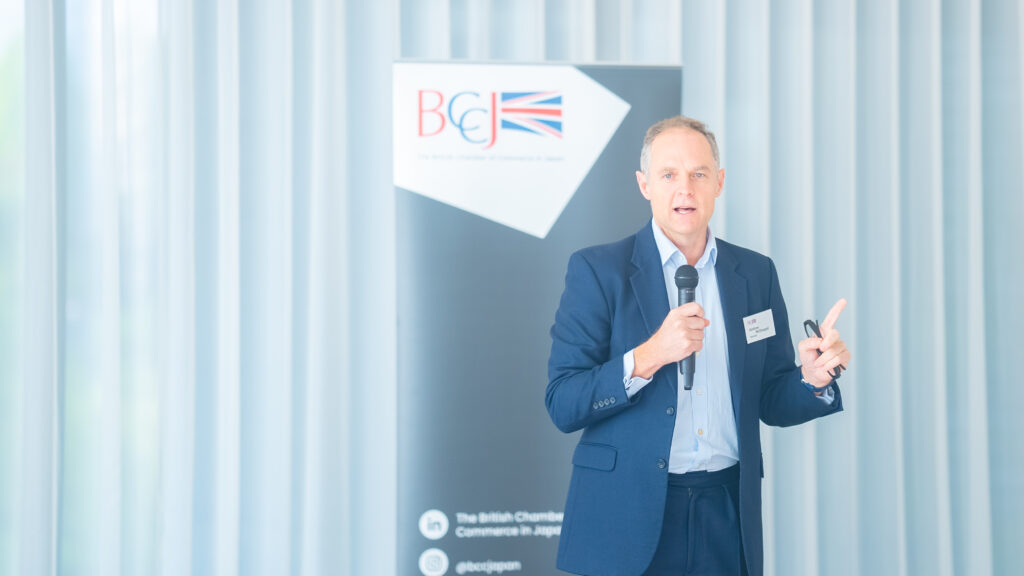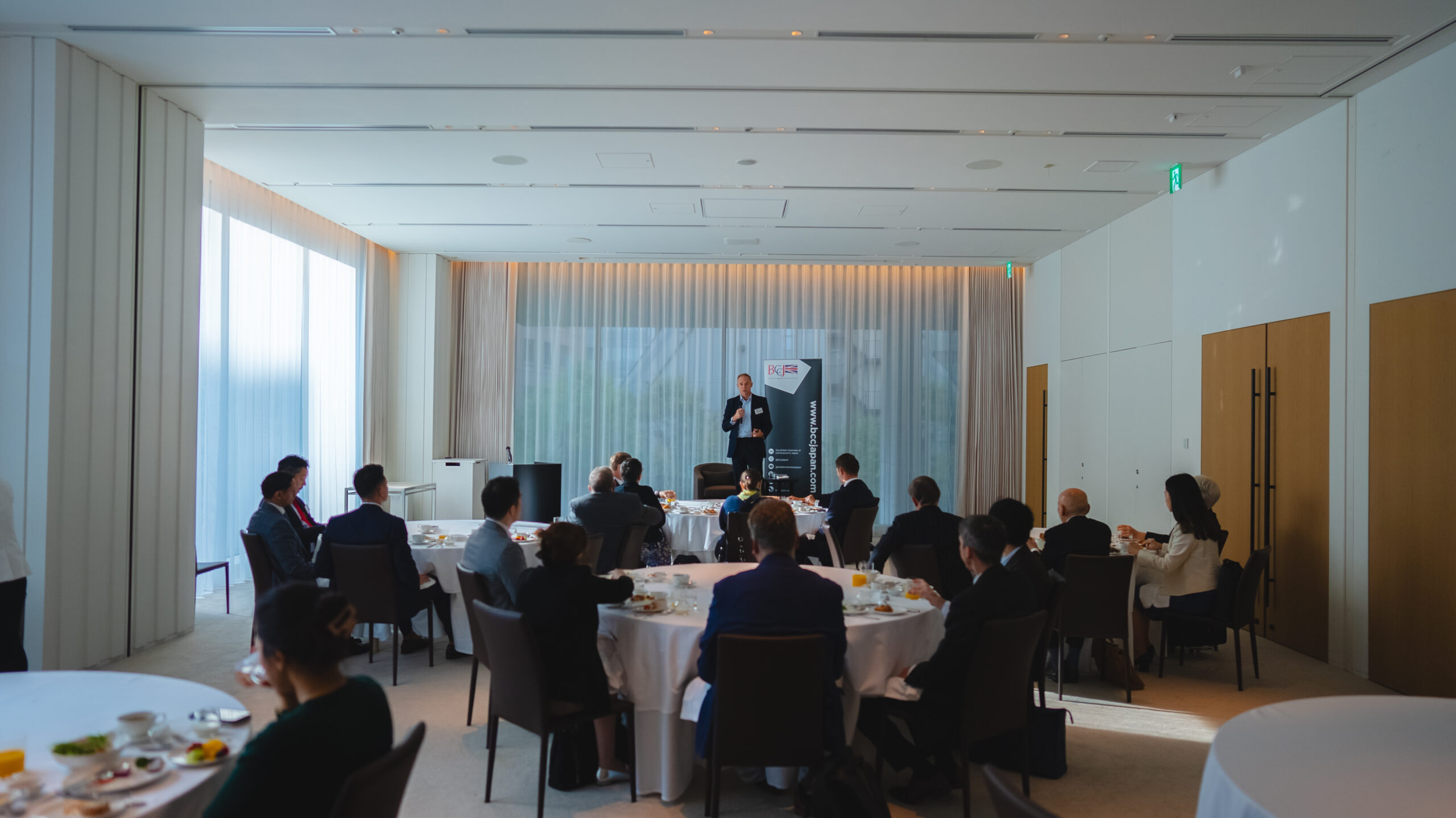Member? Please login
The Convergence of Geopolitics and Business

Written by Sterling Content
November 29, 2024
Past Event Round Ups
With geopolitical risks costing the global economy more than $600 billion annually in lost trade and investment, understanding the geopolitical landscape has never been more critical for businesses operating internationally.
Wars in Europe and the Middle East, the US–China conflict and threats from North Korea and elsewhere have created a dangerous global geopolitical environment. How might businesses in the UK and Japan navigate such risks as “business as usual” becomes increasingly untenable?
Andrew McDougall, managing director and global head of geopolitical risk at Barclays, discussed the most pressing global geopolitical challenges and their implications for businesses at a British Chamber of Commerce in Japan event in November. Having joined Barclays from the UK Foreign Office and with previous experience as a British Army officer, McDougall has front-line experience of global political crises.
Examining the current situation, he said: “We’ve got 800,000 casualties in the Russia–Ukraine war; we’ve got macroeconomic weakness in China; we’ve got escalating conflicts in the Middle East. There are a lot of issues in the world—not just military but also trade—affecting global stability.”
Trump’s election
McDougall outlined some possible impacts, in both the United States and globally, of the election of Donald Trump as US president.
“Trump’s priorities are almost all domestic: immigration, tax reforms, energy,” he said. “He wants to produce more oil, but there is a choice between having higher market share or prices. He will repeal some aspects of the Inflation Reduction Act, such as EV subsidies.”
On trade, McDougall said the appointment of Robert Lighthizer as US Trade Representative showed Trump’s aggressive pro-tariff stance, although he cautioned that tariff hikes would take time to implement.
Ukraine–Russia deal?
McDougall explained that Trump wants a “quick foreign policy victory” and the Ukraine–Russia conflict could fit the bill.
“We’ve heard he wants to end the war in 24 hours – that can’t happen,” he said, while noting that Trump “is putting maximum pressure on Putin and Zelensky [to strike a deal].”
In western Russia, “we are expecting a major offensive by North Korean and Russian forces in the next few weeks, maybe 50,000 soldiers. Despite Trump telling Putin not to escalate, that’s what we’re going to see,” he added.
McDougall suggested a ceasefire agreement could entail Ukraine joining the European Union (EU) and potentially NATO, but being left with a “rump state.”
“Will we see a ceasefire next year? Maybe … It could be more like North and South Korea, a frozen conflict; you may have European troops patrolling a demilitarised zone. It’s not a given but Trump wants this to happen,” he said.
Trump could increase pressure on NATO members to increase defence spending, potentially as high as 3% of GDP, putting pressure on already tight budgets.
The UK could be a beneficiary however, particularly with a UK–EU trade deal due for re-signing.: “Will we see a UK–EU customs union? Maybe one in all but name within five years?” he asked. “Trump’s election and what’s happening in Ukraine may alter the situation.”

Israel–Iran conflict
On the Middle East, McDougall said Israeli Prime Minister Benjamin Netanyahu has “outplayed Biden … He has destroyed Hamas militarily; he’s decapitated Hezbollah’s leadership and its ability to conduct major attacks on Israel. What’s his ultimate objective? It’s to reduce or destroy the threat of Iran. Who will help him do that? Donald Trump.”
McDougall suggested Netanyahu could give Trump a political victory early in his new term.
“As soon as Trump gets inaugurated in January, Netanyahu might say they’ll do a ceasefire in Gaza and Lebanon and the price is maximum US pressure on Iran,” he said.
Ultimately though, McDougall said Trump sees his main foreign policy target as China, with countering the country “the only bipartisan issue in Washington.”
“We know Trump is a deal maker. He wants to put pressure on Beijing to negotiate a good deal with the US, so we might see a trade deal,” McDougall said.
However, he noted that “the big issues such as advanced technology restrictions will remain; Trump will certainly continue Biden’s policies.”
East Asia
On Taiwan, McDougall said China has been gradually building up pressure, with the potential for a Chinese blockade.
“Does that mean war? Absolutely not,” he said. “We do have time, with Taiwan’s municipal elections in 2026 and presidential election in 2028. Beijing wants a Kuomintang victory in 2028. If they don’t win, the invasion risk will go up.”
He also noted the risks of conflict in the South China Sea, with confrontations increasing between China and other nations such as the Philippines, a US defence treaty partner.
“US–China relations will deteriorate, not to a military conflict, but to a trade war. We will see 60% tariffs at some stage in the next four years,” he said.
Adding to global risks, McDougall noted the risk of conflict on the Korean peninsula, which he described as “dangerous as at any time since 1953” due to Russian support for North Korea in areas such as ballistic missile technology.
UK and Japan
McDougall suggested both Japan and the UK could benefit from a Trump administration.
“Both Japan and the UK have a similar relationship with the Americans. Japan is the only ally that has access to US IRA [Inflation Reduction Act] subsidies. The Japanese will continue to be part of AUKUS and the Quad,” he said.
“For the UK, Trump is half-Scottish, so he might be a bit more favourable to military, intelligence, special forces – an advanced technology relationship with the UK.”







